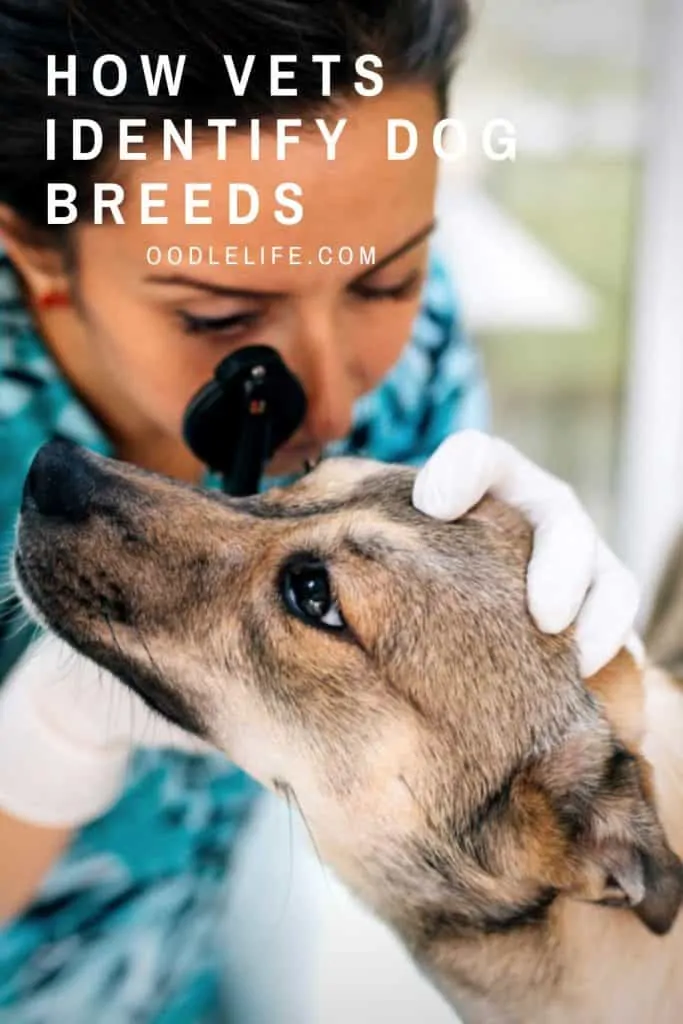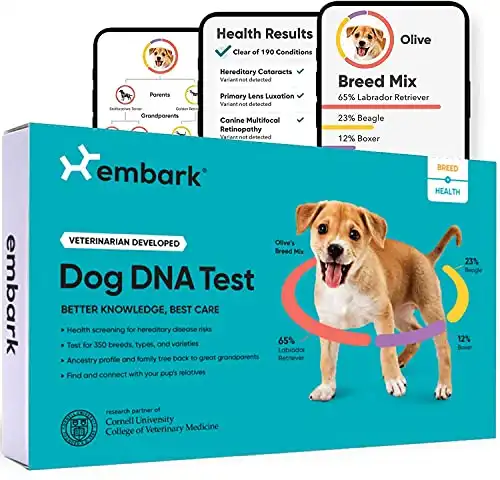Can a Vet Tell Me What Breed My Dog Is? (Plus the Best #1 At-Home Dog DNA Test Vets Approve)
It is pretty easy to tell the difference between a Saint Bernard or a miniature Italian Greyhound. But can you tell the difference between a Scottish and English Terrier? A Labradoodle and an Australian Labradoodle?
Chances are you can’t pick the difference. When you buy or adopt a dog, sometimes questions remain – what actual dog breed is my dog?

Adopting a new dog from a rescue shelter is very rewarding. You are giving a second chance to a deserving puppy. Opening up your heart and home is admirable and more people should look into the rewarding process.
Often when adopting, there are lingering questions. What was the story of the puppy before it found its final home? What has it been through? For some owners, they don’t even know what breed their dog is.
Is there a way to identify a dog breed from a photo? Can a Vet tell me what breed my dog is?
Yes, there are methods that a Veterinarian can use to identify the breed of your dog. They can draw on years of experience, physical characteristics, specific anatomical measurements, and even define your dog on a genetic level.

How A Vet Identifies a Dog Breed from Characteristics?
The approach a Veterinarian takes to identify a dog can take a few different directions. They look to the physical characteristics of the dog to help narrow it down.
I asked Dr. Claudine Sievert, a Veterinarian from Kansas.
Dr. Sievert shares the following physical characteristics she uses to identify unknown dog breeds.
- The size and weight of the dog
- There are large (25-50kg) medium (10-25kg), small breeds (2, 5-10kg), and toy (1-2,5kg) breeds depending on their size and weight.
- The coat color and fur quality.
- The dog can have long or short fur with or without a dense undercoat. The texture of the coat can be more or less soft. Some breeds such is Chinese hairless dogs have minimal amounts of fur on their bodies.
- The shape of the head and the muzzle
- There are so-called brachycephalic dogs with round skulls and very short snouts) Greyhounds have long noses and narrow skulls and are known as a dolichocephalic dog breed. Monocephalic dogs are the most common, and they have proportional skulls (Labrador retriever)
- The way the dog holds its ears
- The guard dogs such as German Shepard are bred to be alert, and their ears are held up, while the dog produced for catching small rodents such as Dachshund hold their ears down to avoid being hurt by their prey.
- The way the dog holds its tail.
- Huskies, Malamutes, Chow-Chows, Norwegian Elkhounds are known for their beautiful tails, which they hold up. At the same time, some dogs, such as French bulldogs, have petite, almost non- existent tails.
- The temperament of the dog
- Each dog breed has its set of personality traits that defines it
- Terrier breeds are known to be aggressive toward other dogs. Labradors and Goldendoodles love to swim in pools, the ocean, and lakes
- A short interview with the owner about traits can go a long way to finalizing the breed identification
- Specific body characteristics that can give a hint.
- Terrier breeds are known for their notorious mustaches.
- Shar-Pei have a lot of skin, which gives them their specific appearance.
- Chow-Chows are famous for their purple tongue.
- The drooping (pendulous) extra-long ears of a Cocker Spaniel or Cockapoo are easy to identify.
Identifying a dog by thoroughly examining the clinical appearance is possible. People often also wonder if a dog breed can be adequately defined by a photograph or if DNA testing is best.
Can a Vet DNA Test to See What Dog Breed?
Vets have had access to DNA testing for dog breeds for a few years now. DNA tests for dogs have become increasingly mainstream. Like ‘Ancestry’ or ’23 and me’ style health DNA analysis for humans – home doggy DNA has become incredibly popular.
In 2020 and beyond, at-home DNA tests are incredibly prevalent. Dog owners are often motivated to know what breed they have. Sometimes they just want to know, but even the experts agree that knowing the breed can help explain behaviors, limit health risks, and improve training.

What is the best dog DNA test that Vets recommend?
There are several dog DNA tests on the market that come highly recommended. I asked contributing Veterinarians for their thoughts for this article, and the most frequently mentioned brand was Embark. Partnered with Cornell University – expect fast results (in the US) of 1-3 weeks. For overseas, add a few weeks for shipping and sequencing.
The database of Embark is pervasive. You might even make contact with distant relative dogs! (They have an ancestry database for tested animals).
The test is easy to do at home – and the results are clear and easy to understand. I can easily see why this panel is one of the highest regarded and most popular dog breed DNA tests.
Are dog DNA tests accurate?
DNA tests are way more accurate than trying to identify dog breeds by photograph or physical characteristics. DNA tests are very rigorous to pinpoint the percentages of which dog breed genetics are present in a dog. Almost no dog is a true purebred!
Given the extreme popularity of low shedding Oodle mix dogs like the Bernedoodle or Cavapoo, the DNA companies are quite good at identifying part breeds present. Their accuracy is excellent and can reveal some exciting surprises to dog owners even if they think they know what breed they have.
A 2012 study in part by the University of Florida with almost 6000 EXPERT responses (Vets, breeders, groomers, trainers) found that the correct dog breed was only identified a bit under 30% of the time. That is a meager percentage outcome!
The study concluded that “regardless of profession, visual identification of the breeds of dogs with unknown heritage is poor. Faulty breed identifications may have lasting consequences” (Abstract of the 2012 Florida University study)
DNA tests are very accurate in comparison with sight and photo identification.

Identifying a dog breed based on photographs is possible.
Although visiting a Veterinarian or even sending a DNA test will be quicker and more accurate, there is plenty of help online that may pinpoint your dog’s breed.
A great idea is to hit up Facebook groups or Reddit subreddits of the dog breeds you suspect might be your pup.
Even rare dog breeds like the Boxerpoo, have a subreddit dedicated to the mix. It never hurts to snap a photograph, post, and ask for advice. Dog lovers might be intense sometimes – but most are always open to providing helpful feedback!
Another approach is to look up photographs online.
You can also play the matching game by looking up suspected breeds of dogs online and then comparing the photographs to your dog.
It helps to document the different breeds as you go. You should also try and find 5-10 photographs of each breed from various sources. This way, you are more likely to get the full range of appearances of each breed to compare to your dog.
Some breeds like the Labradoodle can vary from 100% teddy bear appearance to a straight hair look with no furnishings (mustache).

Do owners really need to know which dog breed they have?
Is it really necessary that a dog owner know which breed their dog is? Is DNA testing a dog just a nice bit of bonus information?
I asked a Veterinarian Dr. Leslie Brooks DVM
Question: Do owners really need to know what breed dog they have?
Dr. Books: “The main reasons it may be important for an owner to know what breeds they have is to what to expect behavior-wise and size-wise. For instance, if they live in a place that doesn’t allow a particular breed or a certain size dog, it would be right for them to know that if they bring home a puppy, that isn’t fully grown.
If a pet parent has a certain lifestyle or living situation that may not accommodate all breed types of dogs, it is good to know what kind of breed would be better suited to live with you.
For instance, if you work 12 hours a day and are busy in your free time, it is probably not a good idea to have a sporting or working dog who really needs to be active and kept stimulated- otherwise, they may develop unwanted behaviors”.
Question: Is it more difficult to identify mixed breed dogs like the Goldendoodle or Cockapoo?
Dr. Brooks: “Yes, it is more difficult with mixed breed dogs, but we can usually ID a few of the features listed above to narrow it down to what breeds are most likely a part of the mix.”
Question: How do Vets identify dog breeds without the help of a DNA test?
Dr. Brooks: “It is almost always an educated guess. We can’t really ever say for certain. Still, we generally ID a dog as a certain breed or mix of breeds by their general features- size, the shape of the face, fur length and type, color, shape, and stature of body, and personality/behavior.”
FAQ about how Vets ID Dog Breeds
Is there a free DNA dog test?
The cost of DNA processing is high. There is no free DNA dog test available on the market. Access to quality testing and analysis does come at a reasonable cost. The cheapest option is to order a highly rated at-home DNA test.
Are There Benefits to Dog DNA Tests?
The private companies that test dog DNA are self-regulated – but do work together and provide data to some partner research facilities. (The Atlantic Article)
It can be possible to identify some health conditions that some breeds are prone too. This can enable better preventative medicine. Many Vets remain to be convinced of the value of higher costs of DNA testing. Some consider it to be a luxury that might not be overly necessary

